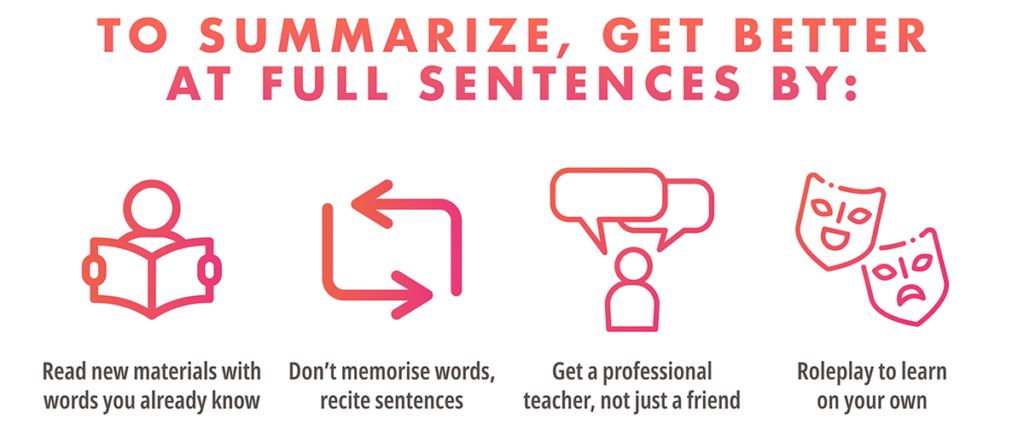Hoe vloeiend Chinees te worden
During our years of being Chinese teachers, many Mandarin learners have asked us the same question: “I learn really hard. I use flashcards, dictionaries. Every day I recite 20 words, I came to China, my vocabulary is 1000, 2000, or even 5000 words by now, but why do I still talk like a baby? Why can’t I understand people on the street?” This basically is the question of how to become fluent in Chinese.
It’s easy to understand why diligent Mandarin learners love the straightforward and linear process of memorizing words. “If we know every word, we shall have no barries in understanding or expressing language.” But this pretense is a false one and doesn’t necessarily lead to Chinese language fluency.
Firstly, new words and barriers to understanding are two different things.
When you just started learning Chinese, small (小xiǎo), big (大dà), person (人rén), friend (朋友péngyou), but did you know the meaning of 大人,小人,小朋友?
At an intermediate level, you may know every word individually in this sentence, without being able to grasp the meaning of their combined meaning:
什么呀?你说的话我一个字也不要相信。
Instead of just memorizing new words, it’s better to have a deeper understanding of the words you already know and master their flexible usages, and quickly recall them, which is the real goal of fluency.
Flexible word leads to fluency in Chinese:
- Keep doing meaningful reading, which means find a variety of materials for the words you already know, the fewer new words the better.
- If you’re a beginner (HSK1-2), after you finish your beginner textbook, find other beginner textbooks to read.
- If you’re elementary and above (HSK3+), use graded reading books or apps.
- If you’re at advanced levels, watch interviews and movies with Chinese subtitles.
- If you really need to expand your vocabulary, do not just memorize the words by themselves, try to recite sentences instead.
Secondly, a good reader doesn’t always make a good listener. What you still need is an effective language environment.
This requires two things: one is output, that is, you have to speak in Chinese. The other is immediate feedback about whether what you just expressed is correct or not.
It’s really difficult for learners to create an effective language environment by themselves. Even if you are living and working in China, your colleagues or friends probably like to communicate with you in English.
And even if your Chinese friends who can’t speak English are willing to chat with you in Chinese all the time, it’s very difficult for them to give you effective feedback: how would they know you make these mistakes because of your native language? A professional teacher will guide you through Chinese conversations so you use Chinese language grammar structures in your own words, instead of reciting them. This sticks better and leads to fluency.
An effective Chinese language environment to develop fluency
First and foremost, if you are able to, get a really good teacher. And here are three tips you need to keep in mind to judge if a teacher is a good one or not:
- He or she speaks English (or your mother-language fluently), but will always stick to speaking to you in Chinese at the level you understand, giving you meaningful input.
- He or she creates tons of situations for you to speak in, giving the output environment, and is able to give the right immediate feedback in a natural way, which means he or she will either keep the conversations flow, or point out/explain your repetitive mistakes and keep you practicing until you get it right more than three times.
- He or she will make you understand communication doesn’t only include the right sentences, but also you need to imitate the right intonation, manner, speed, emphasis and etc.
Besides working with a real teacher, you can also ‘role play’ using the following materials.
- For intermediate and advanced learners, try to watch interviews in Chinese. Interviews are the closest material to real natural conversations you can probably get, pretend you are the interviewer or interviewee, pause after the other person speaks, try to reply by yourself first, and then contrast with the real responses and see what you can improve.
- For all learners, watch learning materials like our “Beyond videos”: videos giving you the real-life speaking conditions, the intonation, the feeling involved, the stress of the words in the sentences, with English, Pinyin and Chinese subtitle. You can choose to be “Michael” or “Ellie” at one time.
Michael & Ellie in our YouTube videos
It’s not easy to learn Chinese — let along develop fluency — but if you find the right ways, it can be more efficient, effective, and therefore enjoyable. I hope these tips are helpful for you and also explain what we focus on with our classes at GoEast Mandarin, whether it’s online or in Shanghai.
You’re very welcome to share this article with other Chinese learners to see if they are facing the same problem en route to becoming fluent in Chinese.












